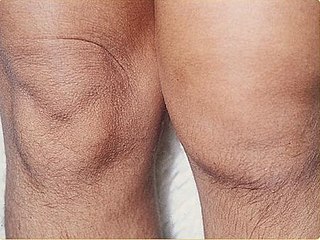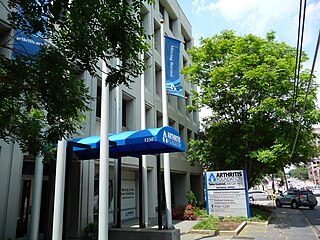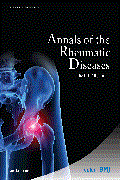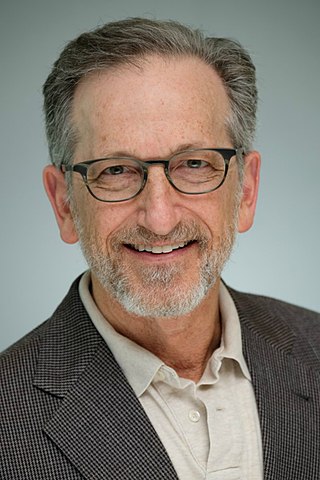
Arthritis is a term often used to mean any disorder that affects joints. Symptoms generally include joint pain and stiffness. Other symptoms may include redness, warmth, swelling, and decreased range of motion of the affected joints. In some types of arthritis, other organs are also affected. Onset can be gradual or sudden.

Rheumatoid arthritis (RA) is a long-term autoimmune disorder that primarily affects joints. It typically results in warm, swollen, and painful joints. Pain and stiffness often worsen following rest. Most commonly, the wrist and hands are involved, with the same joints typically involved on both sides of the body. The disease may also affect other parts of the body, including skin, eyes, lungs, heart, nerves and blood. This may result in a low red blood cell count, inflammation around the lungs, and inflammation around the heart. Fever and low energy may also be present. Often, symptoms come on gradually over weeks to months.
Rheumatism or rheumatic disorders are conditions causing chronic, often intermittent pain affecting the joints or connective tissue. Rheumatism does not designate any specific disorder, but covers at least 200 different conditions, including arthritis and "non-articular rheumatism", also known as "regional pain syndrome" or "soft tissue rheumatism". There is a close overlap between the term soft tissue disorder and rheumatism. Sometimes the term "soft tissue rheumatic disorders" is used to describe these conditions.

Henoch–Schönlein purpura (HSP), also known as IgA vasculitis, is a disease of the skin, mucous membranes, and sometimes other organs that most commonly affects children. In the skin, the disease causes palpable purpura, often with joint pain and abdominal pain. With kidney involvement, there may be a loss of small amounts of blood and protein in the urine, but this usually goes unnoticed; in a small proportion of cases, the kidney involvement proceeds to chronic kidney disease. HSP is often preceded by an infection, such as a throat infection.

Reactive arthritis, also known as Reiter's syndrome, is a form of inflammatory arthritis that develops in response to an infection in another part of the body (cross-reactivity). Coming into contact with bacteria and developing an infection can trigger the disease. By the time the patient presents with symptoms, often the "trigger" infection has been cured or is in remission in chronic cases, thus making determination of the initial cause difficult.
Palindromic rheumatism (PR) is a syndrome characterised by recurrent, self-resolving inflammatory attacks in and around the joints, consists of arthritis or periarticular soft tissue inflammation. The course is often acute onset, with sudden and rapidly developing attacks or flares. There is pain, redness, swelling, and disability of one or multiple joints. The interval between recurrent palindromic attacks and the length of an attack is extremely variable from few hours to days. Attacks may become more frequent with time but there is no joint damage after attacks. It is thought to be an autoimmune disease, possibly an abortive form of rheumatoid arthritis.

The Arthritis Foundation is a nonprofit organization that is dedicated to addressing the needs of people living with arthritis in the United States. There are more than 50 million adults and 300,000 children living with arthritis, the nation's leading cause of disability. The Foundation works to provide information and resources, access to care, advancements in science and community connections.
The American College of Rheumatology is an organization of and for physicians, health professionals, and scientists that advances rheumatology through programs of education, research, advocacy and practice support relating to the care of people with arthritis and rheumatic and musculoskeletal diseases.
Michael D. Lockshin is an American professor and medical researcher. He is a researcher of autoimmune diseases, with focus on antiphospholipid syndrome and lupus. He is currently professor of medicine and obstetrics-gynecology at the Weill-Cornell University Medical College in New York City. In addition, he is director of the Barbara Volcker Center for Women and Rheumatic Disease and co-director of the Mary Kirkland Center for Lupus Research, both at the Hospital for Special Surgery
Detection of autoantibodies against mutated citrullinated vimentin is part of rheumatoid arthritis (RA) diagnostics, especially in sera negative for rheumatoid factor. Anti-MCV antibodies are a member of the ACPA family, a group of the so-called antibodies to citrullinated protein/peptide antigens.

The Annals of the Rheumatic Diseases is a peer-reviewed medical journal. It is published by the BMJ Group on behalf of the European League Against Rheumatism and covers all aspects of rheumatology, including musculoskeletal conditions, arthritis, and connective tissue diseases. The journal publishes basic, clinical, and translational research, as well as abstracts from conferences. The journal was established in 1939. Each issue, the editor-in-chief selects a paper to be published open access as an "Editors Choice". The editor-in-chief is Josef Smolen.
ACR score is a scale to measure change in rheumatoid arthritis symptoms. It is named after the American College of Rheumatology. The ACR score is more often used in clinical trials than in doctor patient-relationships, as it allows a common standard between researchers.

1000minds is a web application for decision-making and conjoint analysis supplied by 1000minds Ltd since 2002.
Ephraim Engleman was an American rheumatologist and a Clinical Professor of Medicine at the University of California, San Francisco. He had a major national and international impact on rheumatology during more than six decades, and wrote more than one hundred scientific and medical papers.

Gary S. Firestein is an American rheumatologist, professor, and founding director of the Altman Clinical and Translational Research Institute (ACTRI) at the University of California San Diego and Senior Associate Vice Chancellor for Health Sciences at University of California, San Diego.
Paul-Peter Tak is an immunologist and academic specialising in the fields of rheumatology and immunology. In addition to academic research, he served as an executive of several pharmaceutical companies.
Nicola Dalbeth is a New Zealand academic rheumatologist whose research focuses on understanding the impact and mechanisms of gout. She supports clinical and laboratory research programmes and holds dual appointments as a full professor at the University of Auckland and as a consultant for the Auckland District Health Board.
Ross E. Petty is a Canadian pediatric rheumatologist. He is a professor emeritus in the Department of Pediatrics at the University of British Columbia and a pediatric rheumatologist at BC Children’s Hospital in Vancouver, Canada. He established Canada’s first formal pediatric rheumatology program at the University of Manitoba in 1976, and three years later, he founded a similar program at the University of British Columbia.
Michelle Leech is the Deputy Dean of Medicine at Monash University and an academic clinician-scientist. Leech oversees the delivery of the Monash medical program and maintains an active research profile and clinical practice as a rheumatologist.
Nancy E. Lane is an American rheumatologist. She is an Endowed Professor of Medicine, Rheumatology, and Aging Research at the University of California, Davis and director of the UC Davis Musculoskeletal Diseases of Aging Research Group. She has also sat on the editorial boards of Nature Reviews Rheumatology, Rheumatology,Seminars in Arthritis and Rheumatism,Arthritis & Rheumatology, and The Journal of Rheumatology.






